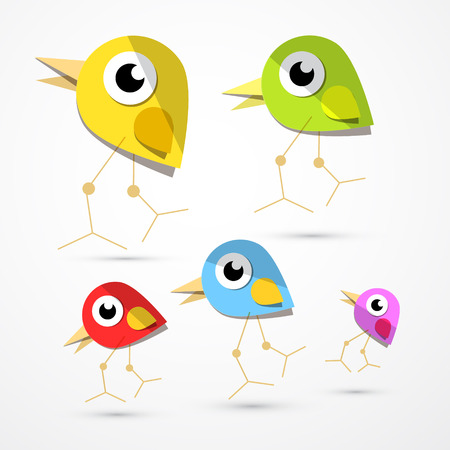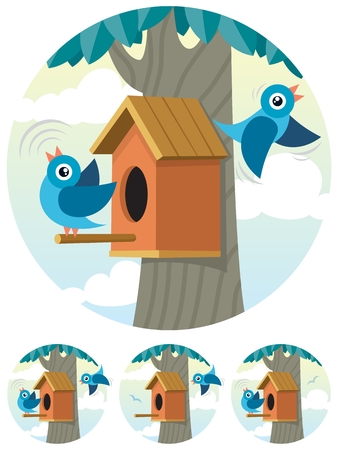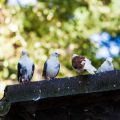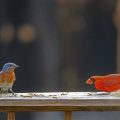Introduction: Nurturing Our Feathered Friends at Home
In every British household where the gentle chirping of pet birds brings warmth and cheer, there lies a unique opportunity to care for these delightful companions with love and mindfulness. Preparing homemade bird food is more than just a practical choice—it is an act of compassion that reflects our commitment to their well-being. As we move away from mass-produced mixes towards fresh, wholesome recipes, we not only ensure our feathered friends receive balanced nutrition, but also create moments of connection and trust. Whether you share your home with a charming budgie, a curious cockatiel, or any other beloved British pet bird, crafting their meals at home allows you to select the finest local ingredients while reducing unnecessary additives. This mindful approach to feeding nourishes both body and spirit, deepening the bond between humans and birds. In this guide, we explore how simple homemade recipes can provide healthful variety and joy to our cherished companions—because in caring for them, we enrich our own lives as well.
Understanding the Needs of British Pet Birds
Caring for pet birds in the UK means embracing their unique personalities and nutritional needs. Whether you have a cheeky budgerigar, a charming canary, or a lively cockatiel, each species requires a thoughtfully balanced diet to flourish. Unlike their wild counterparts, pet birds rely entirely on their human companions for proper nourishment, making it crucial to understand what keeps them happy and healthy.
The staple diets for popular British pet birds vary, but all share one common requirement: variety. Birds thrive when offered a mix of seeds, grains, fresh fruits, and vegetables, rather than a monotonous menu. This diversity ensures that birds receive essential vitamins and minerals, which support their vibrant plumage, energetic behaviour, and robust immune systems.
Below is a simple table highlighting the dietary preferences and special considerations for some beloved British pet bird species:
| Species | Preferred Foods | Key Nutritional Needs | Avoid |
|---|---|---|---|
| Budgerigar | Millet, canary seed, leafy greens, apples (seedless) | High calcium, Vitamin A | Avocado, chocolate, caffeine |
| Canary | Canary seed mix, spinach, boiled egg, carrot | Protein during moulting, Vitamin D3 | Lettuce (low nutrition), onion, salty foods |
| Cockatiel | Sunflower seeds (in moderation), sweetcorn, broccoli, cooked beans | Balanced fats and proteins | Fatty treats in excess, avocado |
| Lovebird | Safflower seeds, berries, peas, pumpkin | Vitamin E and C balance | Dairy products, junk food |
The importance of providing variety cannot be overstated. By rotating foods and incorporating homemade blends tailored to each species’ requirements, you not only prevent boredom but also ensure comprehensive nutrition. Remember that while commercial mixes are convenient, they rarely offer the freshness or diversity needed for optimal health. Embracing homemade bird food recipes allows you to bond with your pets while nurturing them with wholesome options suited to their specific needs. In doing so, you’re not just feeding birds—you’re caring for cherished companions who brighten British homes every day.

Essential Ingredients from the British Pantry
When preparing homemade bird food for your beloved British pet birds, turning to ingredients that are locally sourced and sustainable is both a healthy and ethical choice. By choosing produce grown and harvested across the UK, you not only ensure your birds enjoy fresh, nutrient-rich meals but also extend a helping hand to local farmers and small producers. This approach strengthens our communities and supports responsible farming practices, all while reducing your carbon footprint.
A Charity-Focused Approach to Sourcing Ingredients
Opting for British-grown grains, fruits, and vegetables means your purchases can help sustain local agricultural livelihoods. Many charities in the UK work alongside farmers, encouraging environmentally friendly methods and animal welfare. When you select ingredients certified by organisations like the Soil Association or Red Tractor, you support these positive initiatives. Look for opportunities to buy from local markets or farm shops—these venues often partner with charitable schemes that promote fair trade and ethical sourcing.
Top Sustainable British Ingredients for Homemade Bird Food
| Ingredient | Benefits for Birds | Sourcing Tips |
|---|---|---|
| Oats | Rich in fibre and energy; gentle on digestion | Buy organic oats from local farms or health stores supporting UK growers |
| Barley | Packed with vitamins; excellent for beak health | Look for Red Tractor certified barley at your nearby market |
| Apples (core removed) | Natural sweetness; source of vitamin C and hydration | Select apples from community orchards or pick-your-own farms |
| Kale & Spinach | Leafy greens rich in calcium and antioxidants | Choose organic varieties from local veg box schemes or farm shops |
| Carrots (grated) | Adds colour, beta-carotene, and crunch | Support seasonal vegetable growers in your region |
| Pumpkin Seeds (unsalted) | Boosts protein and healthy fats intake | Purchase from British seed suppliers committed to sustainable harvests |
| Berries (blueberries, blackberries) | High in antioxidants; favoured natural treats | Pick wild berries responsibly or buy from local berry farms during season |
Supporting Local While Nourishing Your Pet Birds
The choices we make as caregivers ripple through our communities. By prioritising British-grown ingredients in your homemade bird food recipes, you foster a cycle of care that uplifts both wildlife and people—supporting ethical agriculture, respecting animal welfare, and nurturing the environment we all share. Every purchase becomes an act of kindness: for your cherished pets, for our dedicated farmers, and for the land that sustains us all.
4. Simple and Healthy Homemade Bird Food Recipes
If you’re looking to treat your feathered friends with something wholesome and homemade, it’s easier than you might think! Here we present a curated selection of simple, nutritious recipes for British pet birds. Each recipe uses common ingredients found in most UK kitchens or gardens, and includes guidance on suitable serving portions. Remember, variety is key to a balanced diet.
Seed & Veggie Medley
| Ingredients | Instructions | Serving Portion |
|---|---|---|
| 2 tbsp sunflower seeds 1 tbsp millet 1 tbsp chopped kale 1 tbsp grated carrot |
Mix all ingredients in a bowl. Serve fresh or store in an airtight container for up to 2 days. | Small birds: 1-2 tsp Medium birds: 2-3 tsp Large birds: 1 tbsp |
Porridge Oats Delight
| Ingredients | Instructions | Serving Portion |
|---|---|---|
| 1 tbsp rolled oats A splash of warm water ½ tsp finely diced apple (core removed) |
Add warm water to oats until soft but not soggy. Stir in apple pieces. Cool before serving. | Small birds: ½ tsp Medium birds: 1 tsp Large birds: 2 tsp |
Garden Herb Treats
| Ingredients | Instructions | Serving Portion |
|---|---|---|
| 1 tbsp fresh parsley, chopped ½ tbsp chopped dandelion leaves (untreated) 1 tsp grated beetroot |
Toss all herbs and beetroot together. Offer as a fresh treat alongside regular food. | A pinch per bird, once or twice weekly. |
Nutritional Tips:
- Avoid adding salt, sugar or processed foods.
- Always wash fruit and veg thoroughly.
- Diversify the menu by rotating recipes throughout the week.
Your caring touch in the kitchen makes all the difference—homemade treats nurture both body and bond for your beloved British birds.
5. Seasonal Variations and Treats
One of the joys of keeping pet birds in the UK is the ever-changing landscape of our seasons. Each season brings its own array of natural foods and flavours, allowing bird keepers to adapt homemade recipes to support their feathered friends’ wellbeing all year round. Not only does this ensure nutritional variety, but it also introduces a sense of novelty and enrichment for your birds.
Adapting Bird Food to British Seasons
The British climate moves from crisp winters through blossoming springs, into warm summers and golden autumns. By tailoring your bird food recipes to what’s fresh and safe each season, you can provide a diet that mimics nature and supports natural behaviours.
| Season | Fresh Ingredients to Include | Special Considerations |
|---|---|---|
| Spring | Dandelion leaves, apple blossom petals (untreated), young peas, tender herbs like parsley | Avoid any garden plants sprayed with chemicals; introduce new greens gradually |
| Summer | Strawberries, blueberries, wild grasses, nasturtium flowers, cucumber slices | Wash fruits thoroughly; serve treats in moderation due to sugar content |
| Autumn | Bramley apple pieces (seedless), blackberries, rowan berries (washed), pumpkin flesh (cooked) | Ensure all seeds and pips are removed; avoid overripe or mouldy fruit |
| Winter | Kale, carrot ribbons, sprouted pulses, small amounts of cooked sweet potato | Keep meals hearty but easy to digest; avoid feeding cold food straight from the fridge |
Treats for Special Moments
Just as we might enjoy a mince pie at Christmas or a scone during afternoon tea, birds too appreciate the occasional treat—especially on special occasions like birthdays or the anniversary of their adoption. Safe treats could include a tiny piece of wholemeal toast with mashed banana or a homemade millet biscuit. Always remember: treats should be given sparingly and must never replace balanced daily nutrition.
Homemade Treat Ideas for British Pet Birds
- Cranberry & Oat Balls: Rolled oats mixed with unsweetened cranberry puree and formed into bite-sized balls.
- Apple & Parsnip Slices: Thinly sliced Bramley apples with steamed parsnip rounds—ideal for winter enrichment.
- Peppermint Pea Mash: Mashed green peas with a hint of chopped fresh mint—refreshing and light for springtime.
- Baked Millet Bars: Millet seed mixed with grated carrot and baked until firm—perfect for beak exercise.
A Note on Safety and Moderation
No matter the season or occasion, always research any new ingredient before offering it to your birds. Avoid avocados, onions, chocolate, caffeine, and anything high in salt or fat. With care and creativity, adapting your homemade bird food recipes throughout the year not only keeps your pets healthy but also celebrates the wonderful cycle of British nature together.
6. Safety Tips and Common Mistakes to Avoid
As we lovingly prepare homemade meals for our feathered friends, it’s vital to remember that good intentions need to be matched with safe practices. British pet birds, much like ourselves, can be sensitive to certain foods and preparation methods. Let’s take a moment to reflect on the key safety tips and common mistakes to avoid, ensuring every home-cooked treat is both nourishing and free from harm.
Avoiding Potential Hazards
Some everyday ingredients in UK kitchens may be dangerous for birds. For instance, chocolate, avocado, onion, garlic, caffeine, and alcohol are all toxic and should never be included in bird recipes. Additionally, highly salted or sugared foods, processed snacks, and foods containing artificial sweeteners are not suitable for your avian companions.
Common Foods Toxic to Pet Birds
| Food Item | Reason for Avoidance |
|---|---|
| Avocado | Contains persin, toxic to birds |
| Chocolate | Theobromine content is harmful |
| Onion & Garlic | Can cause digestive issues and anaemia |
| Caffeine (tea/coffee) | Affects heart function |
| Alcohol | Highly toxic even in small amounts |
Safe Preparation Practices
- Wash all fresh fruit and veg thoroughly to remove pesticides – British produce is often safe, but always double-check.
- Avoid using non-stick cookware that could release fumes when overheated.
- Cook grains and pulses until soft; undercooked beans (especially kidney beans) contain lectins that are dangerous for birds.
Allergy Awareness
Just as people have food allergies, so too can birds. When introducing new homemade foods, start small and observe your bird closely for signs of discomfort such as feather plucking, sneezing, or changes in droppings. If in doubt, consult an avian vet familiar with common UK species like budgies or cockatiels.
A Caring Reminder
Your attention to these details is an act of love. By taking care with every ingredient and preparation step, you’re giving your British pet bird not just delicious food, but the gift of safety and well-being. When in doubt about any recipe or ingredient, it’s always best to seek expert advice—because our companion birds deserve nothing less than our best care.
7. Embracing the Joy of Homemade Care
Homemade bird food is much more than a nourishing meal—it represents a heartfelt act of care that deepens the connection between you and your feathered companions. In the UK, where community spirit and nurturing traditions run deep, preparing healthy recipes for pet birds can become a cherished ritual that brings joy and meaning to daily life. Taking time to craft meals tailored to your bird’s unique needs fosters a sense of responsibility, mindfulness, and purpose, reminding us that even small acts can have significant impact.
Beyond the nutritional advantages, the process itself invites us to slow down and appreciate the companionship our birds provide. It’s an opportunity to observe their preferences, celebrate their personalities, and share in simple pleasures. Many British bird owners find that homemade care encourages not only stronger bonds with their pets but also connections with fellow enthusiasts—whether exchanging tips at local clubs or sharing recipes online.
The Emotional & Communal Benefits at a Glance
| Benefit | Description |
|---|---|
| Deeper Bonds | Preparing food by hand helps build trust and affection between you and your bird. |
| Satisfaction & Purpose | Caring for your pet in this way offers a rewarding sense of accomplishment and daily purpose. |
| Community Connections | Sharing recipes and experiences strengthens ties within local avian communities. |
| Mindful Living | The thoughtful act of creating homemade meals encourages presence and appreciation in daily routines. |
Embracing homemade care is about more than just ingredients; it’s about cultivating a lifestyle of empathy and kindness towards our animals. By choosing to prepare healthy, homemade recipes for your British pet birds, you’re not only supporting their wellbeing—you’re also enriching your own life with moments of joy, connection, and shared purpose. It’s these small, compassionate actions that truly create a home filled with warmth for both you and your cherished avian friends.


